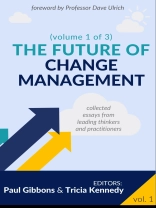There is a quiet revolution happening in change management – in our understanding of how the human mind handles transitions, in behavioral science-based approaches that are many times more effective, and in how new tools help navigate the complexities of change.
Many businesses and even many experts struggle to keep up and, as a result, cling onto old methods that produce mediocre results.
Volume I in the Future of Change Management series starts a journey to change the way businesses change. It has up-to-the-minute treatments of the following topics:
- mental health,
- Chat GPT,
- neuroscience,
- behavioral science and culture change,
- behavioral science and HR,
- behavioral science and evidence-based change,
- design thinking,
- neurodiversity,
- people analytics, and
- behavioral science tools.
But why?
Imagine that right now, you assemble the best 50 change experts you can find. You ask, 'What do you think the most important factor is in organizational change?’
Among the hundred different responses you might hear are trust, psychological safety, inclusion, wellness, purpose, empathy, creativity, changing behaviors, coaching, lean, transformational leadership, emotional intelligence, agile teams, changing culture, facilitating conflict, and leadership alignment.
Now pull down your dusty old CMBOK, Kotter, Prosci, Conner, CCMP, or other change 'bible.’ Find how to create trust, empathy, or creativity in there. Find agile, or lean. Find psychological safety or facilitating conflict.
The fact is that canonical certifications and the work of esteemed pioneers haven’t kept up. Change is too complex, the world is changing too quickly, and science is moving too fast.
The Future of Change Management series aims to bridge the chasm between old school change and the newest ideas.
The Future of Change Management explores the frontiers with expert author-practitioners such as Hilary Scarlett, Newton Cheng, Ignacio Etchebarne, James Healy, Philip Jordanov, Beirem Ben Barrah, Scott Young, Yves Van Durme, Natasha Young, Robert Meza, and Patrick Gallagher.
The book’s editors, Paul Gibbons, and Tricia Kennedy published Change Myths in 2023, and Paul has published five other books on change – notably the bestseller The Science of Organizational Change.
Spis treści
Brains in Constant Change
Mental Health in Workplaces and in Organizational Change
Neurodiversity and Change
Culture Change: Beyond Shared Values
Evidence-based Behavioral Science
Applying Behavioral Science to Human Resources
Behavioral Science Tools for the Change Professional
Uses and Abuses of Design Thinking
Will Chat GPT Replace the Change Manager
People Analytics and Change












